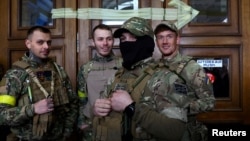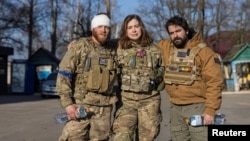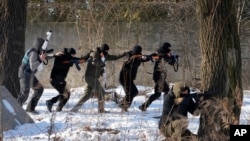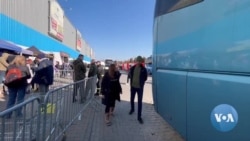The emergence of thousands of foreigners volunteering to fight for Ukraine against Russia’s invasion has drawn sharply differing responses from the governments of those pro-Ukraine fighters, some of whom are from Russia itself and its ally Belarus.
The three main types of responses identified by VOA include Western governments giving tacit or explicit permission to citizens to help Ukraine defend itself; Asian governments ordering citizens not to enter the fight; and Russian and Belarusian authorities denouncing citizens who are fighting on Ukraine’s side and threatening them with severe reprisals.
In its latest estimate, Ukraine’s foreign ministry said March 6 that “almost 20,000 … experienced [military] veterans and volunteers” had applied to join its International Legion of Defense of Ukraine. Ukrainian officials have not said how many of those applicants are in the country, but its defense ministry said those who had arrived by March 11 were from more than 50 countries.
A Ukrainian government website has identified eight of those countries as Britain, Canada, Croatia, Denmark, Israel, Latvia, the Netherlands and Poland.
Three more countries, Norway, Finland and the United States, were named in a Monday report by independent Ukrainian news site LIGA.net. The news site said it obtained the information from Damien Magrou, a Norwegian spokesman for the international legion, who had been working as an attorney for Ukrainian law firm Asters before the invasion.
The LIGA.net report cited Anton Myronovych, a spokesman for Ukraine’s National Army Academy, as telling the news outlet that the legion also has fighters from Australia and South America.
A Ukrainian Embassy official in Washington told VOA earlier this month that 3,000 Americans were among the applicants for the international legion. The official said most of the others were from post-Soviet states such as Georgia and Belarus.
VOA cannot independently confirm the Ukrainian legion’s size or composition. Multiple reports have said an unknown number of foreigners seeking to fight alongside Ukrainian forces also have crossed into the country without going through its procedures for enlisting in the legion.
Among the pro-Ukraine fighters involved in the war are Russian and Belarusian citizens who have been helping to defend Ukraine for years.
They include exiled fighters from the Russian republic of Chechnya who have opposed Moscow since it crushed their separatist campaign in Chechnya after two wars in the 1990s and 2000s.
Chechen fighters have been in Ukraine since 2014, resisting Russian forces and Russian-backed separatists in eastern Ukraine’s Donbas region, according to Britain-based Chechen separatist leader Akhmed Zakayev. The Chechen fighters have not disclosed their numbers.
Exiled Belarusian fighters opposed to Russia and its close ally, longtime Belarusian President Alexander Lukashenko, also have been active in Ukraine’s defense since 2014, according to independent Belarusian newspaper Nasha Niva.
Earlier this month, the fighters — whose “Kastus Kalinouski” battalion is named after a 19th century Belarusian nationalist — posted images on Telegram channel @belwarrior, showing themselves helping their Ukrainian allies in the current war. Lithuania-based exiled Belarusian opposition leader Sviatlana Tsikhanouskaya tweeted a video of the battalion on March 13.
The Russian government has been labeling the pro-Ukraine Chechen fighters as terrorists for years. In recent weeks, the Moscow-appointed leader of Chechnya, Ramzan Kadyrov, has used his Telegram channel and TV appearances to warn the pro-Ukraine Chechen “traitors” that his own forces in Ukraine will hunt down and kill them and harm their family members.
While Lukashenko has not publicly threatened violence against the Belarusian fighters defending Ukraine, he used a March 15 meeting with his security chiefs to call them “crazy” and accused them of fighting only for money.
The Belarusian foreign ministry did not respond to a VOA email asking whether the pro-Ukraine Belarusian fighters could face penalties or punishment if they ever return to Belarus.
Unlike Russia and Belarus, Georgia has been relatively quiet about the years-long presence in Ukraine of some of its citizens who have been part of a pro-Kyiv legion. The Georgian government did not respond to a VOA request for comment about its position on the legion joining Ukraine’s fight against the current Russian invasion. Georgia has had two of its own regions occupied by Russian invaders since a 2008 war.
Former Georgian military officer Mamuka Mamulashvili founded the legion in 2014 to help Ukraine fight the Russian invasion of Donbas that year. He told the British newspaper The Independent earlier this month that he was expecting hundreds of new recruits, including around 400 Georgians, 100 Britons and 50 Americans.
The legion's involvement in Ukraine has intensified a dispute between Georgia's government and opposition about how much Tbilisi should support Kyiv in resisting the Russian invasion.
Some other countries in Asia, however, have been unequivocal about their opposition to their citizens fighting in Ukraine.
The Uzbek justice ministry posted a February 28 warning on the social media app Telegram, four days after Russia began the invasion, saying any Uzbek citizen who enlists in a foreign military or security service may commit a criminal offense punishable by up to five years in prison.
Pakistani Foreign Minister Shah Mahmood Qureshi, responding this month to a VOA Urdu Service question, said Islamabad does “not want any Pakistani to be involved” on either side of Russia’s war against Ukraine.
Watch related video by Celia Mendoza:
Such responses are typical of Asian nations where citizens have significant ties to both Russia and the West and may be motivated to fight for either the Russian or Ukrainian side, said Canadian historian and legal scholar Tyler Wentzell of the University of Toronto in a VOA interview.
“Saying ‘no one can fight on any side of this [foreign] conflict’ is likely a policy you would see in a country where citizens’ participation in one side of a conflict or the other needs to be stamped out to avoid citizens ending up fighting each other and exacerbating schisms at home,” he said.
In Uzbekistan’s case, former U.S. ambassador to the Central Asian nation and Atlantic Council analyst John Herbst said its public emphasis on a law against fighting for foreign governments is part of a traditional Uzbek desire to keep security matters under control.
“It is a fear of Uzbek citizens [in Ukraine] making decisions with geopolitical implications that might complicate Uzbekistan's foreign policy, and a fear of what might happen after they come back to Uzbekistan,” Herbst said.
Western nations also have laws barring citizens from certain foreign military enlistments that could drag their governments involuntarily into foreign conflicts. But officials either have been silent on applying such laws to citizens seeking to defend Ukraine, given mixed messages on the issue or explicitly encouraged citizens to join the fight against the Russians.
The Biden administration has discouraged Americans from volunteering to fight for Ukraine. But it has issued no public warnings about such volunteers risking U.S. prosecution or penalties.
Pentagon press secretary John Kirby told reporters earlier this month that if Americans want to help Ukraine, they should donate to relief agencies.
"We still do not believe Ukraine is a safe place for Americans. We urge them not to go,” he said.
U.S. officials have not said whether they would take action under the Neutrality Act against Americans who ignore that advice. The law applies fines or imprisonment to any U.S. citizen who, within U.S. jurisdiction, "accepts and exercises a commission [payment]” to serve another country in a war against any foreign entity with whom the U.S. is at peace.
In a March 15 op-ed for U.S. online forum Just Security, Ohio State University law professor Dakota Rudesill said Americans joining Ukraine’s fight against Russian invaders risk violating the Neutrality Act because the U.S. is in a state of peace with Moscow, albeit a strained one. But Rudesill noted that the law has ambiguous terms, for example not addressing whether Americans can fight for another country without being paid. He also said it has not been consistently enforced.
Canada, home to the world’s third largest Ukrainian community after Ukraine and Russia, has been less ambiguous than the U.S. in its approach to the issue. In a February 27 news conference, Canadian Foreign Minister Mélanie Joly expressed understanding for Canadians of Ukrainian descent who make an “individual decision” to defend Ukraine.
“Let me be clear: We are all very supportive of any form of support to Ukrainians right now,” she said.
Canadian officials have made no mention of invoking a foreign enlistment law making it an offense for citizens to join the armed forces of a country at war with another state “friendly” to Ottawa.
“We’re not friendly with Russia,” said University of Toronto's Wentzell. “So I don't think the Canadian government is going to use this law against Canadians who volunteer to defend Ukraine,” he said.
Britain’s Foreign Office advised its citizens on March 9 that “if you travel to Ukraine to fight, or to assist others engaged in the conflict, your activities may amount to offenses against U.K. legislation, and you could be prosecuted on your return to the U.K.”
But in a report published the same day, the BBC said many of the hundreds of former British soldiers who expressed a desire to defend Ukraine had told the British news outlet that they were getting mixed messages from the government about whether they should do so. British Foreign Secretary Liz Truss had told the BBC in a February 27 interview that she would “absolutely” support British citizens going to Ukraine to fight “if that is what they want to do.”
Latvia, a post-Soviet state bordering Russia and a member of the NATO alliance of Western nations, has been one of Europe’s most vocal supporters of citizens who want to fight for Ukraine’s defense. Its parliament approved a February 28 law allowing Latvians to do so.
Reuters cited Juris Rancanis, a Latvian lawmaker who led the drafting of the measure, as saying: “Our citizens who want to support Ukraine and volunteer to serve there to defend Ukraine's independence and our common security must be able to do so.”
One reason Western governments have not unequivocally forbidden their citizens from fighting the Russians, as some in Asia have done, is that the populations of those Western nations are overwhelmingly supportive of the Ukrainian people, said Wentzell.
“There will be pockets of people in the West who support Russian policy, but they will be the minority. And for the most part, they will stay silent or out of the way,” he said.
This story was a collaboration involving VOA’s English News Center and VOA's Ukrainian, Russian, Georgian, Uzbek and Urdu Services. Myroslava Gongadze, Ruslan Petrychka, Cevdet Seyhan, Jaleel Akhtar, Ia Meurmishvili, Igor Tsikhanenka and Fatima Tlis contributed. Some information came from Reuters.









